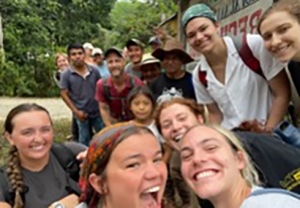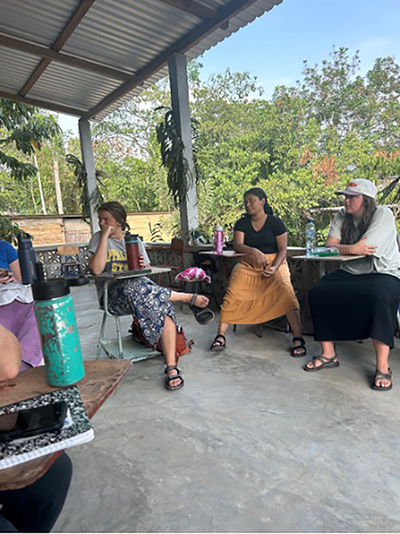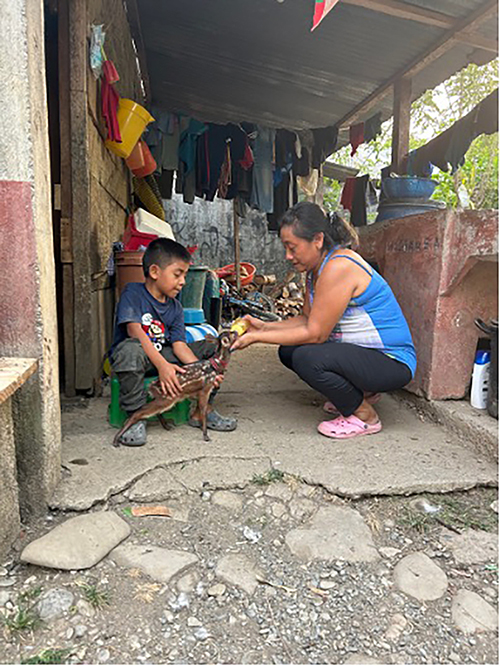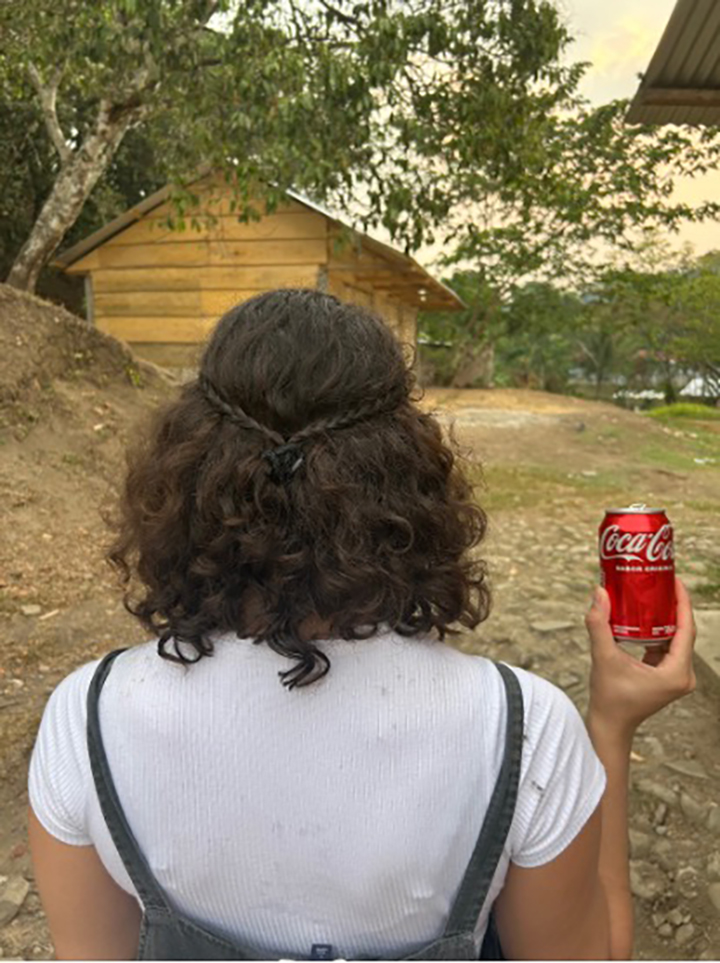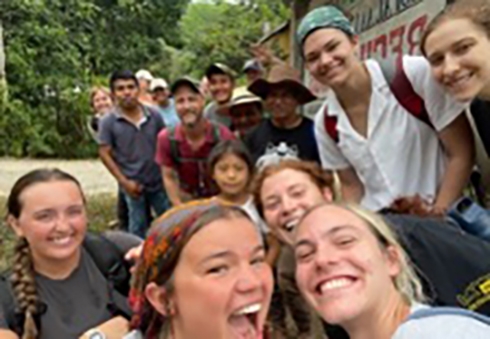Dr. Greg McClure, professor in the Department of Learning, Teaching, and Curriculum, and Dr. Christopher Van Loan, professor in the Department of Child Development, Literacy and Special Education led Honors College students to Coban, Antigua, and Copal AA La Esperanza, Guatemala, June 2 - 13, 2024. In this study-abroad course, students earned three semester hours of credits for HON 3515 Education and Sustainability in Indigenous Guatemala. They met the Honors College international education requirement, which asks students to broaden their perspectives as they consider global interconnectedness through exploring other cultures, worldviews, and frames of reference.
In this study-abroad course, students engaged with the Copal AA community to collaboratively learn about education and sustainability. Their activities included: meeting with the local town council members to learn about their customs, comparing cultures with middle school students, trips along the River Chixoy, and more. The most important aspect of the course, as Dr. McClure described, is the exercise of solidarity.
While we do a lot when we are in the community, the most important thing that we do is to listen and witness. We spend time with people and hear their stories. Stories of a painful and violent past. But also stories of resistance, survival, and commitment to their culture. We witness the amazing work they are doing to care for the earth with future generations in mind, and we also observe the difficult realities they are facing because of climate change. We strengthen our relationship with the community by being present, witnessing, and bringing their story back to others.
Copal AA is a multilingual and multiethnic Indigenous community of Mam, Q’anjob’al, Q’eqchi’, and K’iche Maya people. The community was founded by 86 refugee families in January of 1996 during the last year of the internal armed conflict in Guatemala. It is a community of about 1,000 people, located along the Chixoy River about 30 miles south of the Mexican border in the Alta Verapaz Department of Guatemala.
Dr. McClure shared, “I have been working with this amazing community since 1996 when I served as a human rights observer there. They have endured incredible hardships and are survivors of the Guatemalan genocide, yet they remain focused on making positive, sustainable contributions to the local, regional, and global community. Each year I leave more inspired than ever before."
The Honors College international education requires students to
- Reflect on their interactions with individuals and communities from cultural backgrounds different from their own and explain how these cross-cultural experiences have supported their individual personal, academic, and/or professional growth.
One Honors College student, Rachel Rhoad, a social work major with a minor in Spanish who entered the Honors College and App State in Fall 2023 semester and plans to graduate in May 2027, shared the following reflection of her study-abroad experience with Copal AA. She wrote:
Being in Copal AA…I learned that it is almost always best to try to communicate…You are going to mess up, you are going to get laughed at, you are going to accidentally offend, but all of this is better than not even trying. [You have to] know that you have good intentions, stay aware of your biases, and be able to laugh at yourself. Understanding each other is messy and difficult, especially when there is a language barrier, but that is all the more reason to try. Language is a heavy, powerful tool…You can play around with it. Find the humor in language, its differences, and our own mistakes. This was something I could especially do with the kids. They showed me or drew things and asked the English word. They taught me the Spanish word or the word in the Mayan language they spoke. We laughed at the way English words sounded. We laughed about how my name is prettier in Spanish than in English. We laughed when I couldn’t understand something that was so obvious to them.
Photo above features the students gathered in front of their “home base” outside the community’s house of memory museum in Copal AA. This is where the group had meetings, met with folks from Copal AA, journaled, vented, shared stories, and relaxed. Photo submitted by Rachel Rhoad.
Students in this study-abroad course also met the Honors College international education requirement to
- Cultivate cultural competence and humility by examining the importance of understanding, respecting, and valuing difference in building inclusive communities and addressing global challenges collaboratively.
Specifically, students grappled with inequities in causes and impacts of climate change. Rhoad wrote in her journal before the trip,“I know I am going to feel guilt. Guilt for being white, for being American, for being financially privileged, for not feeling the effects of the climate crisis as heavily as Copal AA, especially when I know I most definitely have had a bigger contribution to the issue than the people of Copal AA…”
After the course, Rhoad reflected, “I think I have new insight: You’re allowed to have guilt. It shows that you care. There’s no need to feel guilty for feeling guilty. Squashing it does not do any good, but neither does wallowing in it. Acknowledge it, move with it, and take care of yourself along the way.”
Photo above features Rhoad’s host family bottle-feeding their one-month-old deer, Bambi. Photo submitted by Rhoad and taken only two hours after she arrived in Copal AA.
Students on this and other HON faculty-led programming:
- Apply a holistic approach to global engagement that encompasses intellectual, cultural, and social dimensions as they explore, discover, learn, and grow with others.
From its origins, Copal AA has had a progressive vision for their community. Dr. McClure explained, “They adopted by-laws that banned the use of slash and burn agriculture, chemical pesticides and fertilizers, and the sale of junk food and alcohol. The residents have spent the last 27 years creating community, caring for themselves and their land, and advocating for positive change for Guatemala’s indigenous communities.”
Photo above of Rachel Rhoad after the girls in the Copal AA community braided her hair. Photo submitted by Rachel Rhoad.
Rhoad reflected on the complexities involved in learning to navigate and appreciate different worldviews. She shared the above photo of herself and stated,
Everyone got their hair braided that day...I love the contrast of going from having my hair braided in a river to drinking a Coca-Cola…the contrast between ideals and reality. In this photo, I am in a beautiful place with gorgeously braided hair, yet I am holding a single-use can of lab-made liquid. It’s a juxtaposition of nature and culture and consumerism. But the can of Coke doesn’t negate the beauty of the rest of the scene; they coexist, and that’s okay.
Rhoad summarized the deeper understanding of this community she gained through all her experiences on this trip,
Copal AA isn’t a utopia. It has flaws like any other community. But its flaws do not negate the incredible things it is and does.
To learn more about the Copal AA community, please visit this website maintained by Friends of Copal AA. Drs. McClure and Van Loan will take another group of Honors College students to the Copal AA community in Guatemala this summer 2025. Stay tuned for another news story highlighting the newest experiences of our students meeting their international education requirements through this faculty-led study-abroad summer offering.
Top photo features the group in front of the Copal AA sign at the entrance of their community.
